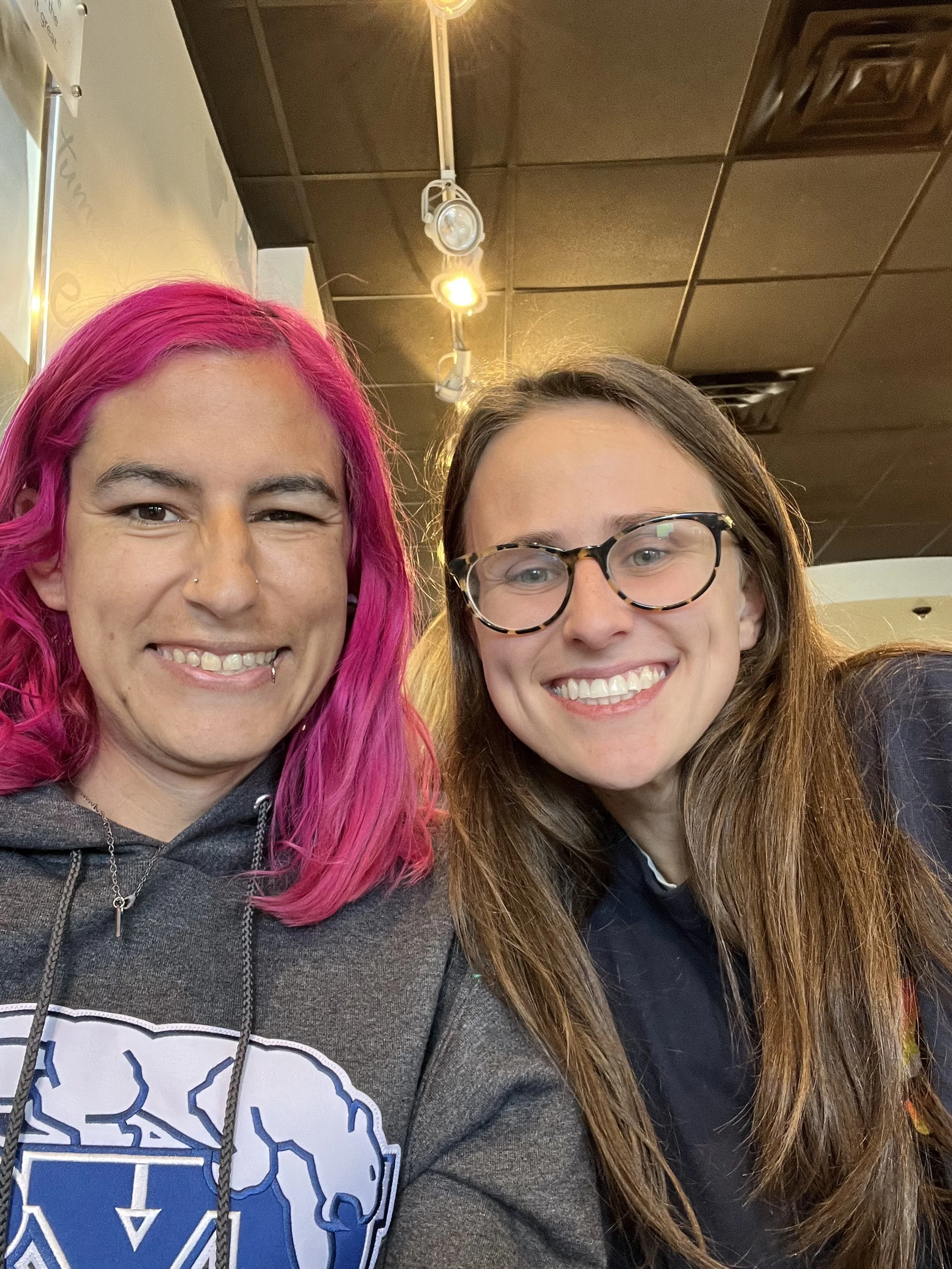Lauren Jones has spent much of her life running. “Running always felt like a safe place for me,” she says. “I was always the skinny kid who was never picked for other sports, but who could run fast. I never felt like I belonged with the boys. Once I started running, I no longer felt lost.” With a father in the military, high school was spent in Germany and then Norway where Lauren first signed up for a cross-country team. In a 2018 feature story on athleteally.org, she shared, “I fell in love with running because I’ve always been an independent person, and I love that running is all about doing my best as an individual.”
During that time, Lauren was struggling with her identity, and while she did not yet understand what being trans meant, she knew she felt more comfortable with the girls’ team. “I kept feeling like I wasn’t competing in the right category as a boy. My race performance was affected, because I was not racing as myself and instead with a mask I never wanted to wear.” Despite that, Lauren was fast enough to sign with New Mexico State University’s men’s team where she competed in the 5k, 8k, and 10k. Lauren has run six marathons, her fastest at 2 hours 52 minutes. She hopes to qualify for the Olympic trials one day.
In college, Lauren struggled with her mental health, saying she found joy when winning races or doing well in school, but that she never felt truly happy. She began exploring her identity in secret, but was scared to come out because she wasn’t sure if or how she’d compete as a trans athlete. “The last thing I wanted was to lose access to the sport I loved.” Toward the end of her sophomore year, Lauren injured her knee around the same time her beloved dog passed away from cancer. Not being able to run, her depression worsened, and Lauren says she’d cry herself to sleep every night and considered ending her life. When she was finally able to run again, she summoned the courage to find community with the LGBTQ group on campus. After meeting a nice friend who listened to her story, Lauren finally realized, “Yes, this is me; I should do me.” She started to come out to her close friends, all of whom were supportive. Valuing her integrity as “an honest person above all else,” Lauren told her friends she would never race without knowing her hormone levels and making sure they were within the required range for trans athletes.
Lauren had grown up Catholic, and when she expressed her desire to transition to her parents, they were not supportive. Their response, “Go to church and pray about it,” turned her off from religion for a long time. Lauren says she suffered a lot of physical and emotional abuse and trauma in her development years, which likely affected her choice of career path. After studying counseling and minoring in history, Lauren completed her undergrad and moved to Arizona for grad school to work toward a masters in general counseling. There, she found a group of trans runners who helped her find confidence in her ability to compete “as who I truly am.” Lauren has found most competitive runners to be open-minded, saying, “They really don’t care too much about what one’s orientation is. Whenever there’s a competitive sector, more pressure exists on where one’s hormone levels stand.” During this time, ASU did a research project and documentary segment on Lauren, as one of the first competitive runners to transition. They found that her heartrate did indeed drop from circulating 140mL of blood to 80mL on testosterone blockers. (link to doc available in stories) This important study revealed much about trans athletes and how hormones affect performance. Of transitioning from male to female, Lauren says, “You lose so much strength and speed—you are not the same at all.”
Around 2019, Lauren was working as a counselor and had undergone HRT (hormone replacement therapy) for quite some time. Battling her eating disorder, Lauren was put into a residential treatment center where she met a Christian woman who she says, “didn’t understand LGBTQ, and I didn’t understand religion and why she’d read the Bible all the time in the common area, but we became friends. We’d wake up every morning and sing ‘Do You Want to Build a Snowman’ together and would laugh and joke so hard at the dinner table until the employees had to tell us to stop.” After they exited the program in 2020, the two stayed close friends, and Reagan invited Lauren to church. But when she told that church she’d like to be baptized, Lauren was told, “Well, you know what the Bible says about this and this…” She, “Okay, no.”
After visiting the University of Utah for a doctor’s appointment for a gender-affirming surgery, Lauren fell in love with mountains similar to the ones she’d loved as a teen in Europe. She decided to move to Herriman, Utah in 2020. Lauren got a job working as a therapist in Logan, UT and had her surgery in 2021. Everywhere, her friends and coworkers would tell her about the LDS faith. “All the people I met were so nice and had similar values—they were kind, cared about others, wanted to help. They weren’t into cussing or substance abuse and all that, and they didn’t just go to church, but maintained what they learned in church. They weren’t hypocritical.”
Lauren asked a physical therapist whether she should look into the church and requested some missionaries. Elders came and said they’d send sisters, but they never did. Finally, Lauren went on the church’s website and requested sister missionaries. Two came and Lauren is still friends with them today. “There was no talk of LGBTQ, they just handed me a book.” Lauren read the first few pages that night and thought it was just what she needed. After having a “deep talk about LGBTQ stuff” with the Relief Society president who Lauren loved, she says they “tried to get me into a building.” Lauren was too scared the first few times, and a job transfer moved her back to Arizona where she met with new sister missionaries. They invited her to be baptized, but church policies required Lauren (who had transitioned) meet with the mission president and bishop who would have to write the first presidency of the church a letter for approval for her to be baptized.
Lauren waited from January until June to hear back. “It was radio silence.” All that time, Lauren says she spent with her new “chosen family” (of close friends who love and treat her well), reading her Book of Mormon, going to church, eating Korean food, and listening to her beloved KPOP and Taylor Swift music. The wait became too much for Lauren’s mental health and she had to go to the hospital for a few days. There, the sister missionaries and Relief Society president visited her, and Lauren was touched by their desire to help. One day, Lauren got a text from the missionaries telling her to call them, they had some news: “Guess what, you’re going to be baptized!” Lauren didn’t want to wait any longer and chose to do it that Friday. She says, “It was really cool to know the prophet knows who I am and accepted me.” Lauren bought a white dress, and was baptized by the bishop, who she says was “a sweet older man” (who unfortunately has since passed away). He gave her a calling on the activities committee, and then met with the stake president to be able to get a patriarchal blessing. Lauren finds her blessing very helpful and affirming.
The church honored Lauren’s name and pronouns on their records when she was baptized. While she says she’d like to go through the temple and serve a mission, she says she doesn’t want to bring it up because of the anxiety she’d endure, not knowing if it’s even possible. “I had to wait six months just to be baptized. I think I know the answer to whether I could go inside, and it’s not upsetting to me because I feel church with friends and people, not with buildings. But I do like to drive to the Mesa temple grounds just to read, which is nice.” Of joining the YSA ward, Lauren says, “I knew this was my group of people and still do, but sometimes it’s really hard. I’d go every Sunday, to all the events with a group of friends. Everyone wants to hang out with me and go to lunch and get Swig. I can talk to anyone, I picked the right profession,” Lauren laughs. “It was hard having to wait, but in the end, it worked out and the prophet heard me, God heard me; they felt my testimony.”
Lauren currently lives back in Las Cruces, New Mexico where she got a job working as a therapist with kids via telehealth. She is on the records in a family ward, where she is the first trans person in their ward. She wants a calling and hopes they will give her one soon.
She often travels to Tempe, AZ where her “found family” and YSA friends live and is currently there recuperating. After a long morning run, Lauren suffered a heart attack a few weeks ago, so she is taking some time now to get healthy. While she was in the hospital for a week, she was again touched by the many LDS members who came and visited.
If Lauren could go back and offer advice to her younger self, she’d say, “Don’t be afraid to be you; just be yourself. Try not to worry about what people think.” She reflects, “If I hadn’t been so worried about how transitioning would affect my running career, or worried about my parents’ reaction, I would have transitioned sooner. But also… things happen when they happen. I just want people to know me as a genuine, honest, loving, and kind person. I’m so grateful for all the friends I’ve had through all this. There were moments I wanted to give up, but life is better just being myself. I’m tired of hiding.”






















